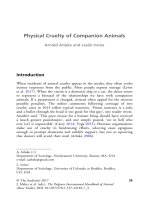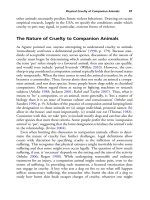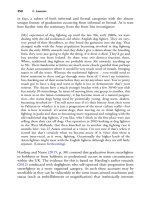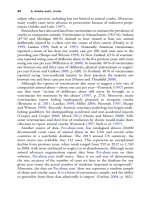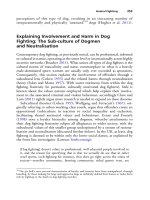The palgrave international handbook of a 158
Bạn đang xem bản rút gọn của tài liệu. Xem và tải ngay bản đầy đủ của tài liệu tại đây (37.06 KB, 1 trang )
Status Dogs
149
homeless, may relinquish their dog to local shelters or animal welfare
organisations or, worse, abandon them.
The cumulative effect of recent legislative developments may yet serve only
to damage the human-dog bond and might exacerbate the status dog
problem. For now we can rightly regard the dog as man’s best friend: despite
the large numbers of dogs kept and the high proportion of these living in
cruel situations, dog attacks on people are rare.
Interventions
Calls for early intervention programmes emerged almost immediately after
the rise of the status dog phenomenon in the UK. The Associate
Parliamentary Group for Animal Welfare mini-report of 2008 reflected the
growing recognition amongst animal welfare organisations of the value of
education, training and awareness-raising as a means of preventing dog
attacks and improving welfare standards. NGOs such as the RSPCA commissioned several research projects, including Status dogs, young people and
criminalisation: towards a preventative strategy (2011), to provide a platform
on which to design such work. But whilst an understanding of the merits of
intervention for ensuring prevention is widespread, the notion that the
evaluation of such programmes is critical to success is perhaps not. Few of
the main animal welfare organisations are able to provide a sound methodology or evidence-base for their programmes and whilst they claim to communicate and co-ordinate with each other to avoid duplication, in reality
natural competition for supporters and donors has probably thwarted that.
‘While there are an increasing number of projects providing information to
young people, few are properly evaluated to determine their effectiveness’
(RSPCA 2012).
Some models of intervention have been imported to the UK from the
USA where they have since, however, been abandoned for being ineffective—
as such the UK is perhaps trailing other nations. Clearly, it should be acknowledged that traditional methods of evaluation are impractical in these circumstances as it is impossible to know how many people would have gone on to be
cruel to their dog or how many dogs would have gone on to attack. Also in
defence of these programmes, it must be noted that there is no universally
recognised method for evaluating intervention programmes in the animal
welfare sphere. Any evaluation must feature practical knowledge of dog
behaviour and training activities—and government patronage has thus far
only amounted to an inadequately funded paper exercise. In practice therefore,
